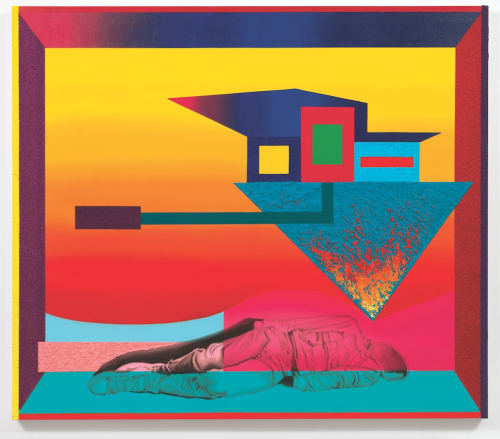There was nothing sleepy about “Grunch in Bed,” Jamaal Peterman’s vigorous Manhattan solo debut. Its eight ample canvases (all 2020) tingle with bright, contrasting colors and textures. Each uses oil paint, as well as patches of vinyl glitter and painted sand, to depict urban and exurban environs composed of interconnected and embedded geometric shapes. Most of the pictures also contain a lone, hoodie-clad human figure—rendered in larger scale and more realistic style—whose activities range from running to lounging to vaulting a wall. “Deep set” trompe l’oeil picture frames are painted in variegated hues around the canvases’ borders, creating the illusion that these scenes play out at a slightly recessed distance.
The exhibition’s title alluded to Buckminster Fuller’s 1983 book, Grunch of Giants, an account of the postwar growth of giant corporations leading to their Gross Universal Cash Heist (GRUNCH). Peterman’s landscapes evoke narratives about Black life in the United States through the human figures’ poses and, in a couple works, the crude iconography—which references events from the Middle Passage to redlining to Black Lives Matter protests—scrawled on sidewalks and brick walls. Yet what makes the paintings powerful is not just their narrative content but also their formal complexity. In particular, the contrast between the supple human figures and the flat, angular cityscapes suggests an oil-water separation between the two.
While the shadowy human figures appear lifelike in comparison to the environment’s planar simplicity, the characters’ missing faces, absent hands, and translucency make them appear ghostlike in their own right. In 30 for 30, for example, we see a figure running mid-stride; his diaphanous legs treading lightly across a hard-edged network of buildings and pipes, even as his hoodie’s opacity renders his upper body conspicuous. Wade in the water also conveys a sense of apartness between the naturalistic figure, in repose on the foreground sidewalk, and the rectilinear blue vista upon which he gazes. Stylistically and spatially, figure and ground feel as though they represent two different realms—two different realities—akin to the effect produced when an animated image is superimposed on a photographic image or vice versa.
The dire consequences of this mutual alienation are driven home in the paintings where the human figure’s body has either been harmed or faces the threat of harm. In You Know It’s Coming, the sky glows a fiery color as a stylish architectural compound hovers above the figure’s prostrate, apparently lifeless body. Broken Democracy juxtaposes the figure taking a knee, arms raised in a “don’t shoot” gesture, against an uncluttered suburban landscape whose blocky houses and Ellsworth Kelly color palette draw on the pleasing idiom of geometric abstraction. Yet the houses’ roofs, whose stretched starry shapes recall Batman “POW!” graphics, hint at the violence latent in the setting’s clean, seductive surfaces.
At a time when depictions of black and brown bodies have become more prominent in painting, Peterman’s “Grunch” series, devoid of skin pigmentation, harkens back to Ralph Ellison’s classic midcentury parable, Invisible Man. Like the novel, the paintings explore the ways that invisibility and hyper-visibility can be products of perceptual and conceptual distortions rather than intrinsic qualities of their subjects. Peterman’s earlier James Fuentes Online exhibition, “Tales from the Hood,” addressed similar themes through an ingenious series of small acrylic paintings that translate police All-Points Bulletin (APB) descriptions of Black suspects—as in the title Black male Red shirt Red pants Locks gold teeth (2020)—into beguiling geometric abstractions. Both bodies of work evidence how Peterman has already, at the outset of his career, developed a complex, deceptively exuberant vocabulary for depicting some
of this country’s darker realities.
This article appears under the title “Jamaal Peterman” in the March/April 2021 issue, pp. 70—71.

